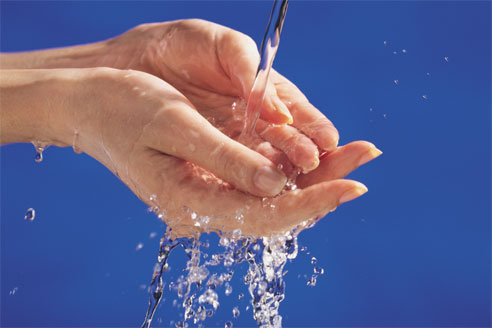严冬到,如何防感冒?
流感疫苗注射通知收到了无数回,却一直没有去。到底还是感冒了,流着鼻涕,打着喷嚏,决定做一回事后诸葛亮,好好学学如何预防感冒和流感,学学怎样才能好得更快一些。筒子里你们可别感冒了,还是一起学学吧。
------ 悉悉索索的小编
Prevent Colds and the Flu
23 ways to stay healthy year-round
Keeping the Germs (微生物,细菌) Away
Flu season is October through early spring, and February is often the peak month. Chances are, when you're burrowed (穴居;潜伏) under the covers (覆盖物,此处指床单) with a box of tissues by your bedside, you turn even greener with envy thinking of those people who seem to never get sick. Want to be one of them?
We can't promise you'll never get hit with another cold or suffer another bout (一回) of the flu, but you can increase your odds (odds 可能的机会,) of staying well with these strategies. If you do get sick, we've also included some tips for getting better faster.
While colds won't kill you, they can weaken your immune (免疫的) system to the point that other, more serious, germs can take hold (扎根) in your body. Just think how many times your cold turned into bronchitis (支气管炎) or a sinus (鼻窦) infection (感染). And given that the average American adult suffers two to three colds a year, that's a lot of opportunities for serious illness -- and just as many to prevent one! There's even more incentive to prevent the flu: Every year in the United States about 200,000 people are hospitalized and 36,000 die from the flu or its complications (并发症).
1. Wash your hands and wash them often. The Naval Health Research Center conducted a study of 40,000 recruits (新兵;新分子;新会员) who were ordered to wash their hands five times a day. The recruits cut their incidence of respiratory (呼吸的) illnesses by 45 percent.
2. Wash your hands twice every time you wash them. When Columbia University researchers looked for germs on volunteers' hands, they found one handwashing had little effect, even when using antibacterial(抗菌的) soap. So wash twice if you're serious about fending off (fend off避开) colds.
3. Use this hand-drying strategy in public restrooms. Studies find a shockingly large percentage of people fail to wash their hands after using a public restroom. And every single one of them touches the door handle on the way out. So after washing your hands, use a paper towel to turn off the faucet (龙头). Use another paper towel to dry your hands, then open the door with that paper towel as a barrier between you and the handle. It sounds nuts, but it's an actual recommendation from the Centers for Disease Control to protect you from infectious (有传染性的) diseases like cold and flu.
4. Carry hand sanitizer (消毒杀菌剂) with you. Colds are typically passed not from coughing or kissing (although those are two modes of transmission [传播,传输]) but from hand-to-hand or hand-to-object contact, since most cold viruses can live for hours on objects. You then put your hand in or near your mouth or nose, and voilà (法语:瞧,那就是)! You're sick. Carry hand sanitizer gel or sanitizing towelettes (小毛巾,湿餐巾纸) with you and you can clean your hands anytime, even if the closest water supply is 100 miles away. It works. One study of absenteeism (缺勤, 旷工[课]) due to infection in elementary schools found schools using the gel sanitizer had absentee rates from infection nearly 20 percent lower than those using other hand-cleaning methods.
5. Use your knuckle (指关节) to rub your eyes. It's less likely to be contaminated (污染) with viruses than your fingertip. This is particularly important given that the eye provides a perfect entry point for germs, and the average person rubs his eyes or nose or scratches his face 20-50 times a day, notes Jordan Rubin, Ph.D., author of the book The Maker's Diet.
6. Run your toothbrush through the microwave on high for 10 seconds to kill germs that can cause colds and other illnesses. You think it gets your teeth clean -- and it does. But once you're done brushing, your toothbrush is a breeding (孵化) ground for germs. Sterilize it in the microwave before you use it, or store it in hydrogen peroxide (过氧化氢) (rinse 洗 well before using), or simply replace it every month when you change the page on your calendar and after you've had a cold.


